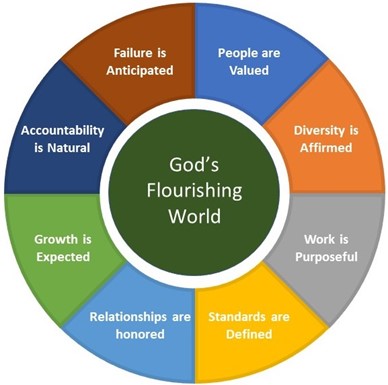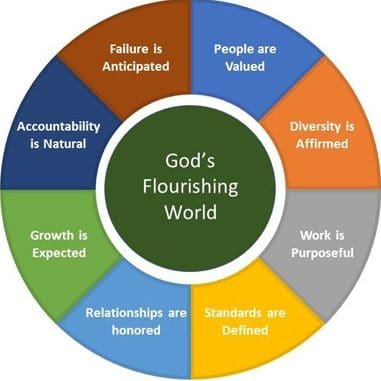June 22, 2022
God’s world was beautiful and perfect! It was filled with all the ingredients that would allow flourishing to continue for generations. Yet, while God had created a perfect and flourishing world, He was not caught off guard by the failure of Adam and Eve! As He cursed the serpent, He revealed His plan for ultimate victory, thousands of years before it would happen.
And I will put enmity between you and the woman, and between your offspring and hers; he will crush your head, and you will strike his heel” (Genesis 3:15, NIV).
Then, after cursing the serpent and the ground, God continues to act in response to Adam and Eve’s disobedience. Again, God demonstrates that He was not surprised by their actions.
The Lord God made garments of skin for Adam and his wife and clothed them (Genesis 3:21).
God graciously provided leather clothing for Adam and Eve; much more durable than the simple leaves they had used to cover themselves. He put new boundaries in place and provided new direction for Adam to work the ground outside the beautiful garden environment.
Anticipating failure accelerates flourishing by acknowledging the intent.
While God did not intend for the first couple to fail, he anticipated it and was prepared for what happened. He could not spare them from the consequences of their sin, but He would provide next steps for them to take. His intent after their failure was for them to live as fully as possible in a flourishing world. He was ready to help them move past their failure.
In our broken world, we can certainly anticipate failure on a regular basis! Anticipating failure does not mean looking for it in every action or assignment, but it does mean thinking ahead to reflect on what steps may be needed when failure occurs. Serving leaders learn that it is better to be prepared for failure than surprised by it!
Anticipating failure accelerates flourishing by anticipating the impact.
Since the first failure of Adam and Eve, we have had plenty of opportunities to learn from failures! But we are often surprised when we hear stories of leaders who have been caught in a scandal and caught off guard when something doesn’t go as planned.
Many respond to failure with fear and shame. They fear the consequences, the punishment, and the shame of their failure so they cover up failure, deny it or run from it.
Others respond by making failure as their identity. Instead of saying, “I failed” they accept the identity, “I am a failure.” This response provides no productive way forward.
But serving leaders learn to anticipate failure and prepare well for it. As they do, their teams can flourish. The fear of failure will be replaced by a willingness to anticipate the reality of failure and use it as a part of the learning journey. Serving leaders remind their team that even when they fail, failure is not their identity! Serving leaders anticipate that failure will bring growth to their team.
Anticipating failure accelerates flourishing by accepting the implications.
Serving leaders learn from Adam and Eve to anticipate failure, first in themselves but also in those they lead. They don’t dwell on failure and don’t encourage it. But they anticipate it and lead their teams to a healthy expectation that there will be failures on the journey. They teach their teams to fail well, not being blindsided by failure and not rejoicing in it but acknowledging it. They lean into failure, design plans to address it and learn from it! By talking about failure and removing the stigma on their team, they accelerate flourishing even in a broken world. Serving leaders cannot recreate the garden of Eden, but as they anticipate failure, they do create a flourishing world in which individuals and teams learn to thrive through failure.
Serving leaders continually cultivate into their leadership all the ingredients needed for a flourishing world. And the result can be seen in the people around them who are flourishing.
For further reflection and discussion:
How has thinking about failure been distorted in your context? Reflect specifically about the thinking in this area in your culture, your family, and in the organization you lead. What impact has this thinking had on you as a leader? In what ways do you need to adjust your thinking to align with God’s intent?
Reflect on what the impact would be if everyone in your organization would fully grasp and live out what it means to anticipate failure. Write at least three reflections.
What action steps will you take as a leader to anticipate failure in your home, organization or community? Choose which of these areas you will focus on and then list 2 or 3 specific steps you will take and dates for when you will take the actions.
Until next time, yours on the journey,
Jon Byler
In the next issue, we’ll start a new series!


